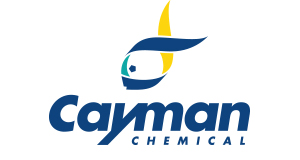Transferrin Receptor Protein 1/CD71 Monoclonal Antibody (Clone 3F3-FMA)
Transferrin Receptor Protein 1/CD71 Monoclonal Antibody (Clone 3F3-FMA)
Artikelnummer
CAY36655
Verpackungseinheit
100 µg
Hersteller
Cayman Chemical
Verfügbarkeit:
wird geladen...
Preis wird geladen...
Formulation: 100 µg of protein G-purified monoclonal antibody
Immunogen: Purified membrane fractions from OCI-LY7 cells
Clone Designation: 3F3-FMA
Shelf life (days): 1095
Notes: Transferrin receptor (TfR1), also known as CD71, is a homodimeric transmembrane receptor for transferrin (Item No. 32030) that facilitates iron delivery into cells and is encoded by TFRC in humans.{46988} It is composed of two TfR1 monomers, each containing a cytoplasmic tail, an internalization motif, a membrane-spanning portion, and a stalk region that covalently links the monomers. An extracellular ectodomain binds transferrin and drives TfR1 dimerization.{46988,55229} TfR1 is ubiquitously expressed, except on mature red blood cells and certain terminally differentiated cells, with the highest expression on immature erythroid cells and in the placenta, and is involved in erythropoiesis, lymphocyte development, and hematopoietic expansion in the bone marrow.{54708,54709} TfR1/transferrin-mediated iron transport contributes to the intracellular iron pool required for ferroptosis and the anti-TfR1 antibody (clone 3F3-FMA) has been used in combination with anti-malondialdehyde antibodies to identify ferroptotic cells in vitro and human cancer tissue in a mouse xenograft model.{46994} TFRC is overexpressed in various breast cancer tumors and gliomas and positively correlated with poor prognosis.{46992} Cayman’s Transferrin Receptor Protein 1/CD71 Monoclonal Antibody (Clone 3F3-FMA) can be used for immunofluorescence (IF) and Western blot (WB) applications. The antibody recognizes TfR1 at approximately 85 kDa from human samples.
Immunogen: Purified membrane fractions from OCI-LY7 cells
Clone Designation: 3F3-FMA
Shelf life (days): 1095
Notes: Transferrin receptor (TfR1), also known as CD71, is a homodimeric transmembrane receptor for transferrin (Item No. 32030) that facilitates iron delivery into cells and is encoded by TFRC in humans.{46988} It is composed of two TfR1 monomers, each containing a cytoplasmic tail, an internalization motif, a membrane-spanning portion, and a stalk region that covalently links the monomers. An extracellular ectodomain binds transferrin and drives TfR1 dimerization.{46988,55229} TfR1 is ubiquitously expressed, except on mature red blood cells and certain terminally differentiated cells, with the highest expression on immature erythroid cells and in the placenta, and is involved in erythropoiesis, lymphocyte development, and hematopoietic expansion in the bone marrow.{54708,54709} TfR1/transferrin-mediated iron transport contributes to the intracellular iron pool required for ferroptosis and the anti-TfR1 antibody (clone 3F3-FMA) has been used in combination with anti-malondialdehyde antibodies to identify ferroptotic cells in vitro and human cancer tissue in a mouse xenograft model.{46994} TFRC is overexpressed in various breast cancer tumors and gliomas and positively correlated with poor prognosis.{46992} Cayman’s Transferrin Receptor Protein 1/CD71 Monoclonal Antibody (Clone 3F3-FMA) can be used for immunofluorescence (IF) and Western blot (WB) applications. The antibody recognizes TfR1 at approximately 85 kDa from human samples.
| Artikelnummer | CAY36655 |
|---|---|
| Hersteller | Cayman Chemical |
| Hersteller Artikelnummer | 36655-100 |
| Verpackungseinheit | 100 µg |
| Mengeneinheit | STK |
| Reaktivität | Human |
| Klonalität | Monoclonal |
| Methode | Immunofluorescence, Western Blotting |
| Isotyp | IgG1 |
| Wirt | Mouse |
| Produktinformation (PDF) | Download |
| MSDS (PDF) | Download |

 English
English







